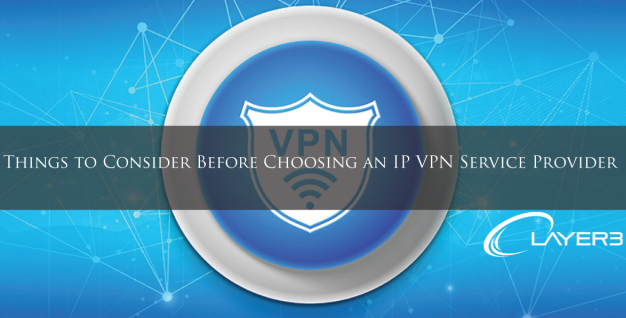Telecom
Things to Consider Before Choosing an IP VPN Service Provider

You want secure networks for your organization. Currently, you’re using VPNs. But you’ve been told that IP VPNs are an even better option, as they offer extra protection against security risks.

Now you’re wondering whether you should transit to IP VPN or stick with what you currently use. Maybe you don’t know much about the new option, and you’re not conversant with your existing solution either. What’s the superior alternative? What should you go with?
This article is a guide to answering these questions.
Let’s begin by explaining some of the terms involved.
An IP (Internet Protocol) address is a number that is given to every device that connects to the internet. It’s like a ‘name’ or means of identification for each device; no two devices bear the same number.
Besides identifying the device (and, by extension, its user), it also indicates the location of the user and their device. For instance, you can tell what country a person is in through their IP address.
A VPN (Virtual Private Network) is a network setup that lets its users connect to their organizations’ internal network remotely via the public internet. It makes it possible for employees to access their company’s shared files from locations outside its physical offices.
An IP VPN functions in a similar way to a regular VPN. But there’s at least one difference: IP VPN connects to internal networks via private gateways, rather than the public internet.
How IP VPN Works
IP VPN utilizes something called Multiprotocol Label Switching (MPLS) to allow the user to get to their organization’s intranet while avoiding the public internet.
The MPLS sorts the bits of data passing through the World Wide Web into appropriate groups—video, voice, or images for instance. It also speeds up the transmission of these data to their destination.
Why Choose an IP VPN Instead of a VPN?
An IP VPN can help you expand your bandwidth and increase uptimes for your applications. It’s not as susceptible to DoS (Denial of Service) attacks as a regular VPN. Because it functions away from the public internet, it’s not vulnerable to many of the threats that come through the broader web.
What to Consider Before Choosing an IP VPN Provider
Many firms offer IP VPN as a product. But they won’t all give you the same quality of service. That’s why you need to know what to look out for when prospecting for a service provider in this area.
Here are some things you should consider.
- Security
This is one reason why you want to get an IP VPN in the first place, so you should be sure that your vendor’s offering will guarantee it. If you find that the details related to this are too technical, you should ask your IT team to look at what’s being offered. They may spot defective aspects of the product, or give it an all-clear, depending on the results of their assessment.
- Speed
Your IP VPN should give you the advantage of a higher speed connection, compared to the public internet. Several factors will affect the speed of your network, including some localized to your organization or location. But it may be a function of the quality that a vendor can provide. So you should consider the reputation of various vendors in this area before deciding which one you will go with.
- User Friendliness
Can you use the service without much help? Or is it so complex that you require a technician to help you with it?
Your IP VPN should give you good user experience. The fact that it’s somewhat advanced technology isn’t an excuse for complexity. If you can’t navigate it yourself after a few tries, it’s probably not worth your while.
- Access
This service lets you connect all your business locations to your organization’s internal files and other resources. A high-grade IP VPN should enable you to achieve quick access to your business’s intranet regardless of where you are.
- Price
It’s important to compare prices too, where you can. Look for an IP VPN provider that gives the best balance of price and quality that matches your needs. On one hand, unusually low prices may indicate less than optimal product quality. But there may be a less expensive option than the pricey IP VPN services that are just as effective.
- Support
What happens if you run into some difficulty while using an IP VPN? Is the service provider always available to take on your requests for help?
Support is an important part of any IT vendor’s package. They should have resources that cover the issues you are most likely to encounter while using their service. You should also be able to speak with their agents when this is the more helpful thing to do.
Should You Choose a VPN or IP VPN?
You can settle with a regular VPN if:
- You are a small business with little need for the sort of expanded bandwidth that IP VPN gives.
- You don’t have a lot of staff working remotely.
- There’s no significant IT security threat.
Consider using an IP VPN if you meet these criteria:
- You are a medium or large scale business that has to deal with a lot of traffic on your networks.
- A lot of your employees work remotely.
- There’s a potential but significant IT security threat to your organization.
Final Words
There’s a lot that Virtual Private Networks can do for your company. With IP VPNs you can achieve even more. Whether it’s securing your banking details or raising the efficiency of your VoIP systems, this technology can make your operations much easier and more secure.
When you weigh up your options for an IP VPN service provider, you’ll certainly prefer one that’s been around for a while. You will also want them to know the peculiarities of the environment you work in.
That’s what you get with Layer3. For over 14 years, we have helped organizations in the public and private sectors with IT solutions they need to function optimally. We bring this experience to bear in our delivery of IP VPN services. Our team can deploy one that suits your specific needs, and provide expert management and support along with it.
If you would like to find out more about our access solutions, you can contact us here.
Telecom
Lebara, New Operator Enters Nigerian Telecom Arena, Sells Minutes, Not Airtime

Lebara Nigeria has officially stepped into Nigeria’s bustling telecom market with the introduction of its unique 0724 number series—a bold move that promises fresh competition and a more transparent user experience.

Leveraging its status as a Tier 5 Mobile Virtual Network Operator (MVNO), the company is positioning itself not just as another telecom player but as a catalyst for change, offering innovative packages built on fairness and clarity.
From day one, Lebara Nigeria has been ready to compete with industry giants like MTN, Airtel, Globacom, and 9mobile, having secured full interconnectivity with all of them.
This critical footprint ensures that its voice and data services are accessible and of high quality nationwide.
Akin Adesokan, Lebara’s chief operating officer, highlighted the company’s strategic intent: “Our readiness with the 0724 series and full interconnect setup underscores our unwavering commitment to seamless integration, customer freedom, and market inclusivity.” Indeed, the company has taken considerable steps to ensure regulatory compliance and operational strength, leveraging its global expertise as an MVNO and its freshly minted licence under the NCC’s highest tier.
What truly differentiates Lebara’s offering is its unconventional pricing model. Eschewing traditional prepaid airtime, it sells voice bundles and data packages that align with real usage, not ambiguous credit deductions. “You buy minutes, not airtime. If your call ends in 30 seconds, you still have 99 minutes and 30 seconds left. That’s the kind of clarity and control we are bringing to Nigerian telecoms,” explained Samuel Alabi, head of Corporate Communications.
This clarity responds to a long-standing frustration among Nigerians, where ₦100 airtime often disappears quickly and opaquely. Lebara’s minutes-based system offers predictability and transparency—a refreshing contrast in a market hungry for accountability.
Lebara’s entrance is more than a marketing exercise; it’s a strategic diversification of Nigeria’s mobile ecosystem.
With over 220 million active mobile lines, Nigeria is Africa’s biggest telecom consumer.
The NCC’s move to licence 41 MVNOs, including Lebara, illustrates a policy shift aimed at introducing more competition and improving service quality. Technically agile and digitally native, Lebara leverages existing network infrastructure, augmented by automated systems—a lean operation compared to the capital-intensive MNO model.
he status quo. With strategic execution and continued regulatory support, this could mark the beginning of a new chapter: one where Nigerians no longer need to ask, “Can you hear me now?” but instead say, “Yes—and I know exactly what it cost.”
Telecom
PIN Pushes for Equitable Digital Governance at World Internet Forum

As the 20th Global Internet Governance Forum (IGF) opens in Lillestrøm, Norway, leading pan-African social enterprise Paradigm Initiative (PIN) is championing grassroots voices in global digital policy discussions.

Running from June 23–27 under the theme “Building Digital Governance Together,” the IGF unites stakeholders from civil society, governments, the private sector, and technical communities to tackle pressing digital issues such as access, AI ethics, surveillance, and content moderation.
The discussions also contribute to the upcoming World Summit on the Information Society (WSIS)+20 review in December 2025.
PIN’s participation comes at a time when digital governance decisions are increasingly shaping the future of billions. “It is essential that grassroots solutions are heard,” said ‘Gbenga Sesan, Executive Director of PIN. “At PIN, we believe that meaningful digital inclusion requires more than just connectivity.
“It demands inclusive, progressive and sustainable policies and frameworks built taking the realities of grassroots stakeholders into consideration.”
Representing PIN at IGF 2025 are Sesan, Chief Operating Officer Nnenna Paul-Ugochukwu, and Senior Manager for Partnerships and Engagements Thobekile Matimbe. They will engage in strategic sessions on topics like connectivity in excluded communities, AI accountability in content moderation, and human rights in emerging tech.
The team will also participate in coordination meetings with partners including Meta, UNESCO, the Freedom Online Coalition, and GPD.
PIN’s presence at the forum underscores its ongoing mission to embed digital rights within grassroots realities and to ensure that global internet governance frameworks are inclusive, accountable, and responsive to the needs of marginalised communities.
Telecom
Remmy Nweke’s “The Village Priest” Garners High Praise from Tech Community

Information and Communications Technologies (ICT) stakeholders have applauded the latest in bookshelf by Remmy Nweke, the Village Priest, which was presented at the recently concluded Nigeria DigitalSENSE Africa Forum on Internet Governance for Development (IG4D) in Lagos.

The presentation and review of the book, “The Village Priest” by Ogbuefi Remmy Nweke, largely described as a powerful narrative explored the intersection of tradition and innovation in rural Igboland, received widespread acclaim, with its themes resonating deeply with the event’s focus on ‘Global Digital Compact: Opportunities for Multi-stakeholders in Nigeria.’
The highly anticipated review was delivered by Mr. ‘Gbenga Sesan, Executive Director of Paradigm Initiative (PIN), a renowned social entrepreneur and advocate for digital rights and inclusion in Africa.
Sesan lauded Nweke’s prose fiction for its insightful portrayal of “innovative technology adaptation transforming rural communities,” describing it as “a careful work of cultural documentation, offering not just a story but a chronicle—a record of transition that many rural and even urban African communities continue to live through.”
Sesan’s review highlighted the book’s central character, Ogboo AniEze, the revered chief priest of Ilimefo, whose life is dedicated to preserving his village’s customs. The narrative unfolds as “the village and its people, their traditional practices and strong cultural heritage at the crossroads!” with the arrival of GSM technology—a “strange and mysterious piece of technology” that initially challenges Ogboo AniEze’s traditional views.
The review detailed the chief priest’s journey of reconciliation, from initial fear of GSM eroding cultural heritage to a profound understanding that the technology “also offered opportunities for growth, development, and connection with the wider world.” This transformation leads to a new era of harmony in Ilimefo, where “tradition and modernity coexisted in balance.” The book beautifully illustrates how mobile phones become “a powerful tool for preserving the village’s cultural heritage” and how interfaith collaboration, particularly with Catholic priest Fada Ekie, fosters a “fusion of traditions” and a “new spiritual identity.”
“It teaches us, without preaching,” Sesan concluded, “that true innovation is not in abandoning our roots, but in strengthening them with new tools.”
This year’s Nigeria DigitalSENSE Forum, was presided over by Dr. Jimson Olufuye, former President of the Information Technology (Industry) Association of Nigeria and a member of the UN Secretary-General’s IGF Multistakeholder Advisory Group (MAG), served as a crucial platform for discussing the future of digital governance.
Olufuye also commended the author, Nweke for his perseverance in serving the ICT industry as well as endearing documentation of the sector.
For the Managing Director, Internet Exchange Point of Nigeria, Mr. Muhammed Rudman, the latest book by Nweke depicts the gift of in depth creativity and urged him on, despite the challenges the sectorial environment throws at industry players.
Organized by ITREALMS Media and hosted under DigitalSENSE Africa (DSA), an At-Large Structure certified by ICANN, the forum brought together key partners including the Nigerian Communications Commission (NCC), Internet Exchange Point of Nigeria, Internet Society Nigeria chapter, Association of Licensed Telecoms Operators of Nigeria (ALTON), and ICANN.
The NDSF series, running since 2009, continues to “motivate public discourse and create awareness on the technological cum business benefits of rapidly advancing technologies capable of impacting on Internet Governance, Internet Protocol (IP) addresses and domain name industry, access and affordability,” while offering a vital platform for industry networking.
The event not only celebrated the literary achievement of Ogbuefi Remmy Nweke, a multiple award-winning journalist, but also reinforced the commitment of ICT stakeholders to fostering digital inclusion and innovation across Nigeria.

 Telecom1 day ago
Telecom1 day agoMTN Says New N6.98 USSD Charge Won’t Affect Airtime Recharge

 Telecom1 day ago
Telecom1 day agoNnaemeka Ani Calls on African Techies to Rewrite the Narrative

 General News1 day ago
General News1 day agoStudy Reveals 7% of Industrial Organizations Tackle Vulnerabilities Only When Necessary

 E-Financial1 day ago
E-Financial1 day agoSofri Rejigs Digital Platforms for Better Customer Experience

 General News1 day ago
General News1 day agoNITDA, NCFRMI Forge Strategic Alliance for Inclusive Digital Transformation of Displaced Nigerians

 Telecom1 day ago
Telecom1 day agoCrypto Scam Unmasked: U.S. Recovers Record $225m in Global Fraud Bust

 E-Financial1 day ago
E-Financial1 day agoDLM Group Unveils Innovative Sovereign Bond Backed Composite Notes

 E-Financial10 hours ago
E-Financial10 hours agoS&P Global Ratings Downgrades Ecobank Nigeria’s Credit Rating to CCC-, Outlook Negative

























